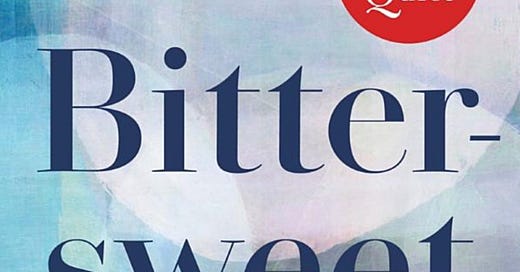Beyond Bittersweet: In Defense of Sentimentality
or at least of Sad Dad Bands and Steel Magnolias
In another lifetime, I told a guy I’d just started dating that The Replacements were one of my favorite bands. This was absolutely not true in the sense that I literally knew only one song they’d made and that song—”Sadly Beautiful”—sounds almost nothing like any of their other songs. But, it was true in the sense that this one song felt like the most perfect vocalization of a feeling I suspected was central to the way I understood the world.
Susan Cain opens her recent book Bittersweet with an exploration of the appeal that sad music (Leonard Cohen) has for some people and then moves to more broadly investigate the power that feelings of longing and wistfulness have to be as comforting as they are painful. The book even has a quiz (!) to assess how prone the reader is to lingering in the bittersweet (I have always been, it will not be a surprise to hear, very prone).
I was a high school junior when I discovered “Sadly Beautiful.” The experience the song evokes was both totally foreign and entirely familiar. I loved this song for the same reason I loved The Wonder Years and the oldies station and 1980s station wagons: it felt like a through-line to something I suspected I would someday feel.
From the very last time you waved and honked your horn
To a face that turned away pale and worn
Had no chance at all to let you know
You left me sadly, beautiful
Left me sadly, beautiful
I realize that pasting these lyrics as a 40-year old is a little maudlin, or at least is evidence of my maudlin inclinations. But, part of what I loved about Cain’s book is the sense of relief and recognition I felt in reading about the long, varied cultural traditions around the bittersweet (a much better word than maudlin!). When Nick and I were getting married, the band had to gently suggest that the entire set list not consist of Wilco songs. In that recent McSweeney’s piece, “What Your Favorite Sad Dad Band Says About You,” I could not pick just one favorite among the many sad dad favorites. After all, I’ve been a sad dad, apparently, since I was fifteen!
Over the weekend my family and I flew to Minneapolis so that Nick could run the Twin Cities Marathon where he was hoping to run a Boston Qualifying time (he did!). We stayed with my brother and his wife who were, as always, welcoming, tireless, and gracious hosts. In the course of the three days we were there, fall settled in and the leaves on the trees went from all green to mostly yellow and orange. I raced a 10k, we took the kids to a fall festival, ate delicious food, and the world of daily life felt remote in the best possible way.
I grew up in New England and the foliage and scent of fall here will always feel like home, but any time I’m in the northern midwest in October, I notice something different in the quality of the light and the smell of fall in the air that, although I can’t quite pinpoint it, fills me with longing for the years I ran college cross country and the long drives in the 15-passenger van to Eau Claire or Lacrosse, Wisconsin.
On the flight home, which didn’t leave Minneapolis until after 9 eastern time, both Thea and Simon fell asleep and for the first time in a very long time, I watched Steel Magnolias. I thought, as I was watching, about how that movie would never get made now and how, yes, it’s a little cheesy and maybe even emotionally manipulative at times, but how I just love it so much. On the drive home from the airport, flush with nostalgia for the first time I saw the movie as a kid, and a little longing for autumns—both New England and Midwestern—of the past, a song from the Music Together playlist I’d uploaded to my phone when the kids were babies began to play and I felt another layer of nostalgia.
I was feeling all of this with at least a little self-awareness and considered that perhaps I am the ideal audience not just for bittersweet feelings about the Music Together CD but about Music Together baby classes themselves: earnest and prone to nostalgia and a little sentimental. I, one of those parents who absolutely did not need to hear that “it goes by so fast” was already wistful the first time I heard the Music Together CD (having been listening to “Sadly Beautiful” since adolescence and watching Steel Magnolias since grade school).
Autumn, of course, is a particularly bittersweet season (Susan Cain points this out, too). I’d just cheered for a marathon and watched Steel Magnolias and was on already missing not just the smell of fall in Minnesota but much more deeply, my brother and his wife and the years when I rode around in a 15-passenger van to race on golf courses of the northern midwest.
But—and maybe this is coming from a place of sleep-deprivation and impending book release anxiety and intellectual laziness—is art that’s sentimental definitionally bad?




